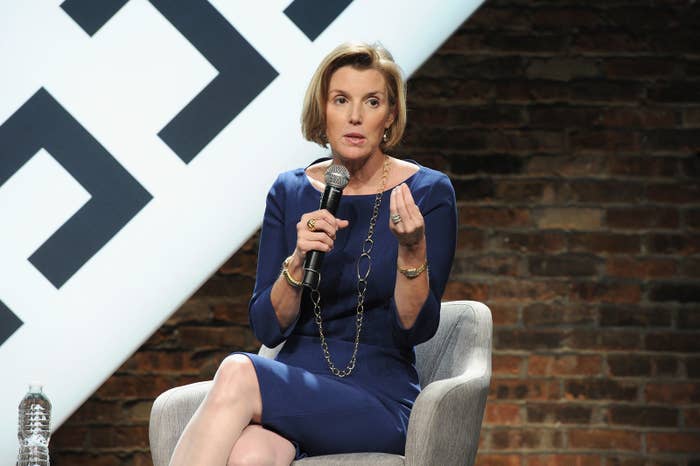
They roll over their credit card debt instead of paying it off. They spend too much of their paychecks instead of building a nest egg. They don't research investments or seek out financial advice, and feel too spooked about how to handle their money.
These are just some of the big mistakes that young women — and other people, but young women in particular — makes with their money, says Sallie Krawcheck, a longtime top executive on Wall Street who now runs her own financial advisory company Ellevest.
Krawcheck, who founded Ellevest in 2015, had previously worked as the head of both Merrill Lynch and Citi's wealth management businesses. She was also the chief financial officer of Citi from 2005 to 2007. And her forthcoming book, Own It: The Power of Women at Work, talks about how women can overcome the many obvious obstacles in front of them.
Below, some excerpts from a question-and-answer session with Krawcheck, whose company uses the slogan, "Invest Like a Woman. Because Money is Power."
On credit cards and emergency funds:
Pay off your credit cards every month. "Rolling over" credit card debt, or pushing off interest and principal payments into the next month, is one of the most expensive forms of debt you can carry.
"The number of women we have come across who are making $70,000, $80,000, $100,000 and are actually rolling over their credit card is crazy," Krawcheck said. "There is a lot of advice out there telling them to build up their emergency fund to pay off credit card debt — that's the most asinine advice on the planet."
Krawcheck called it "simply nuts" to roll over a credit card balance with interest rates around 20% in order to build up savings. Many people think of savings as "insurance" against a big expense like car repairs and medical bills. But, Krawcheck points out, it's incredibly expensive insurance and it's precisely when you need to spend more than you have right now that it makes sense to use a credit card, not the other way around.
As she put it, "The problem for many women is that they tend to earn less money than men, have to pay more of their income in student loans because they're more likely to go to college, which stunts their ability to cover their other expenses."
.@BlogHer I could go on for this for hours.....1st is some say to build emergency fund before paying down credit card debt. No no no no no
A mistake all young people can make: just spending too much:
"What I think is a mistake young people make: They spend everything they make, and they get themselves in a precarious position."
Krawcheck recommends instead that people spend about half of their take-home pay on things they truly need — rent, groceries, clothes for work — and then 30% on whatever they want and 20% on investing and savings. "The people who have that ratio are much less likely to go bankrupt," she said.
Krawcheck also recommends using a work-provided 401(k) to take advantage of an employer match. "I’m surprised by how many people don’t know they have a 401(k) match at work and that’s actually free money," she said.
Women are actually great investors, they just don't do it enough:
When it comes to money, women tend to underestimate themselves.
"Women are better investors — at home, at hedge funds, and at mutual funds," Krawcheck said. What makes men worse at investing and trading is overconfidence, she said: Their obsession with beating the market prompts them to make too many trades and rack up fees that eat into their gains.
"They fall in love with winners, they pay too much, they sell the losers too fast, they overtrade," Krawchecks said. "The truth is those are not the mistakes women make. These are all the mistakes men make — and their biggest mistake in investing is they don’t do it."
Of the thousands of women whom Krawcheck's employees at Ellevest talk to, she said, "Only one said they want to outperform the market, and they thought it was supposed to the the answer."
Krawcheck said that many women are perfectionists who get paralyzed by the amount of data and options available for investments, which prompts them not to save at all.
"They believe what society tells them — that they need more financial education," Krawcheck said. "It can cost hundreds of thousands, or even millions, of dollars.
@dianebrady Yes....but historically it's been much more costly not to. For some women, we estimate the cost of not investing to be $100/day
Year after year, women trade better than men https://t.co/FfzwaRpaZw @cnbc
Women are taught from a young age not think about money in a serious or substantive way:
"Nobody talks to us about it when we grow up, we’ve done thousands of hours of research with women — it’s not that women are dumb," Krawcheck said. "The dad talks to the son about money, and women get the message that it's crass and unattractive."
This means that savings and investments are locked away from normal conversation and social interaction, Krawcheck said. "We’re not allowed to talk about money," she said, adding wryly: "You have sex on the second, third, or fourth date, but you would never talk about money on the second date."
The existing financial advisory industry is overwhelmingly male and focused on selling to men:
"The financial advisers are 80% male and 60 years old and overwhelming white, they’re talking about beating the market and outperforming," Krawcheck said. "The symbol is a bull, it’s phallic."
Then, a zinger — one that rings true. "There’s not a woman on the planet that watches Jim Cramer," Krawcheck said.
